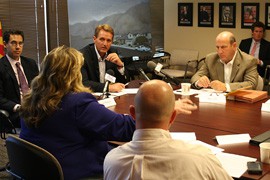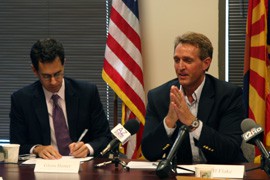Cronkite News has moved to a new home at cronkitenews.azpbs.org. Use this site to search archives from 2011 to May 2015. You can search the new site for current stories.
Flake says EPA’s regulations stifle job growth in Arizona
PHOENIX – The Environmental Protection Agency’s strict enforcement of air-quality regulations in Arizona is stifling job creation and proving costly to businesses unable to meet the standards, U.S. Rep. Jeff Flake said Wednesday.
“We can strike a balance here between protecting the environment and having economic development, but we just need the federal government to cooperate,” Flake, a Republican running for U.S. Senate, said during a meeting with business leaders.
Arizona and the EPA have wrangled for years over how the Clean Air Act should apply to particulate pollution in Maricopa County, which the agency determined to be out of compliance. At the center of the dispute is how much dust in the air occurs naturally and how much is attributable to farms, sand and gravel operations, construction and the like.
Federal transportation funding could be in jeopardy if Arizona isn’t in compliance. The Maricopa Association of Governments in 2007 developed a plan for reducing dust by 5 percent a year, but the EPA hasn’t accepted it.
Todd Sanders, president & CEO of the Greater Phoenix Chamber of Commerce, told Flake that trying to anticipate and comply with air-quality regulations creates uncertainty, making businesses less inclined to spend money and hire.
“It’s more expensive to do business; it’s more expensive to expand your business,” Sanders said.
Flake faulted the EPA’s process for local governments looking to avoid penalties for so-called exceptional events like Arizona dust storms that drive areas out of compliance with air-quality regulations.
Preparing an application for an exceptional event takes on average 450 man-hours and $64,000, according to the Department of Environmental Quality. To reduce paperwork and create a more streamlined process, Flake has introduced the Commonsense Legislative Exceptional Events Reforms Act, or CLEER Act.
“The EPA simply won’t recognize that Phoenix is not Seattle,” Flake said. “Some air standards that apply in Seattle might not work here.”
In a telephone interview, Eric Massey, director of ADEQ’s air quality division, said agriculture and the sand and gravel industry in particular face uncertainty over EPA mandates.
“To go for additional controls would be extremely costly,” Massey said.
Philip Bashaw, government relations manager at the Arizona Farm Bureau, said in a telephone interview that the EPA shouldn’t look at levels of coarse matter in Arizona the same as in Boston because the causes are different.
“The stuff we have here, we don’t believe has the same impact as the combust material,” Bashaw said.
Richard Carmona, Flake’s Democratic opponent for U.S. Senate, believes that farmers and developers in Arizona should be able to do business without interference from harmful regulations, said Andy Barr, a campaign spokesman.
“Our solution is for the EPA to adopt more flexible, realistic standards so we do protect our environment,” Barr said.








